 |
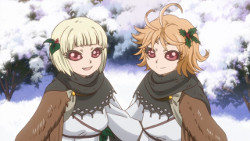 |
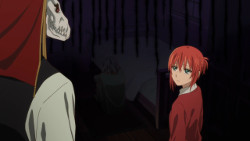 |
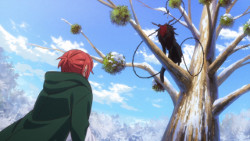 |
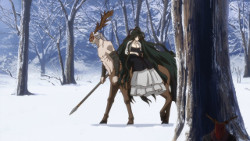 |
 |
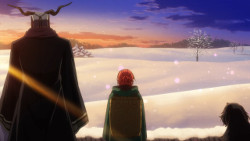 |
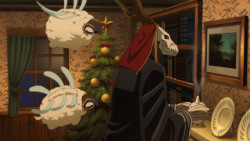 |
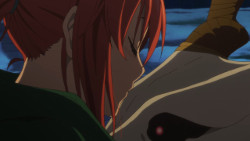 |
 |
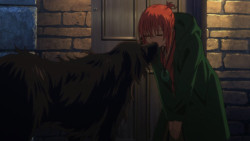 |
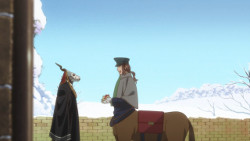 |
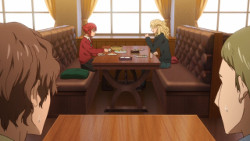 |
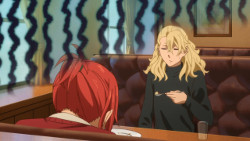 |
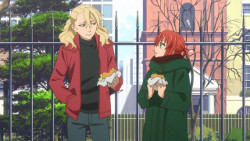 |
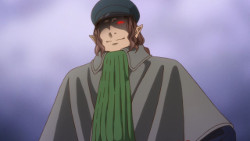 |
 |
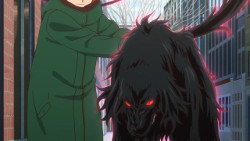 |
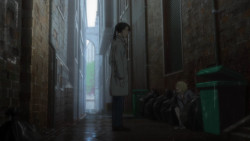 |
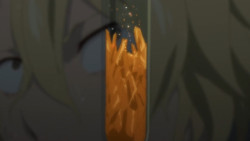 |
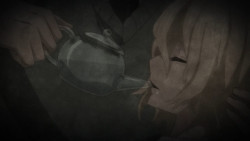 |
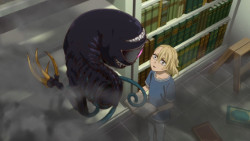 |
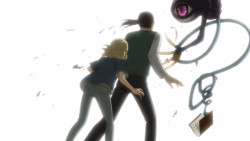 |
 |
 |
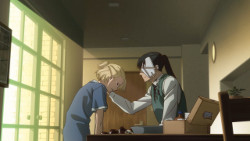 |
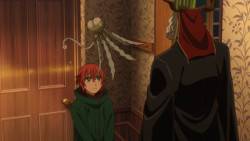 |
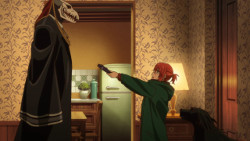 |
 |
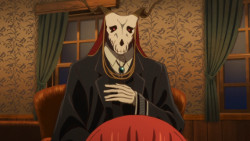 |
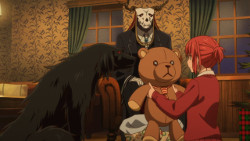 |
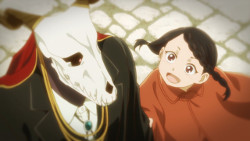 |
 |
 |
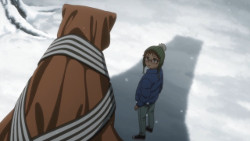 |
 |
「God’s Mill Grinds Slow but Sure」
One thing which I think is even more noticeable in the anime version of Mahoutsukai no Yome than the manga is the interesting flow of this series. I’m reminded of a river with many meanders, some of which come so close to overlap that one can glance over and see what’s to come, only to have the course of the water flow away again. Then one day, around the latest bend, you realize that the course of the river has taken you back to something familiar but temporarily forgotten.
There’s a strong sense of that here, as the narrative leisurely takes us back to reintegrate with elements from the past and teases us with glimpses of what’s to come. More than anything this is one of those episodes of The Ancient Magus Bride that seems in no hurry to get much done – it revels in the quiet magic of the moment for the most part. This series can make one feel the power ancient mysteries still hold over the human psyche better than any in recent memory – it’s that timeless thing again, the way past and future seem to lose some of their definition. We may scorn ancient superstitions these days, but most have little idea that the customs they habitually live their lives by were shaped by those old rituals.
Christmas is one of those customs, of course – based on the Yule tradition which predates Christianity’s arrival in Western Europe, dating back at least to Odin worship and possibly much earlier. As with most Christian holidays it’s a pagan festival sanitized for the believers’ consumption, but in the world of The Ancient Magus’ Bride the old traditions still hold sway. The “Yule Twins“, the mistletoe (that was even more adorable in anime form), the Wild Hunt – there are echoes of a mysterious world all through Elias and Chise’s preparation for the Day of Yule.
That said, Chise is a modern girl (albeit from Japan, where Christmas is still another sort of festival), and Elias is learning how to act like a modern human, so Christmas has its say, too. That’s especially so when Alice sends a feathered courier asking Chise to meet her in London – a little mystery all to itself. Chise sneaks out, knowing Elias would forbid her to go alone or (perhaps worse) insist on coming with her. As is he sends a little spy, and of course Ruth is along for the ride to Paddington as well. Alice’s request, as it happens, is for some help choosing a gift for Renfred – which prompts Chise to consider that she ought to get something for Elias (remember, in Japan Christmas is more a dating holiday than a gift-exchange one).
Alice is an interesting case, a sort of antagonistic ally so far – she and Renfred representing something very different and generally antagonistic towards Elias. But in many ways she’s quite a natural friend for Chise, who lacks companionship from girls roughly her own age – and both of them have deeply painful pasts (as most in this story seem to have). Alice’s intrudes itself on an otherwise pleasant holiday shopping trip in London, and it’s only Alice’s fierceness and Ruth’s ability to be intimidating that prevents things from getting really ugly. Chise insists that Alice share her story (she’s all about sharing painful pasts now), and it seems clear that even if sorcerers and wizards are naturally enemies, Renfred is a decent and compassionate man and Alice would do anything to protect him.
Chise’s gift for Elias turns out to be a bolo tie (which, if I’m honest, looks to my eye exactly the same as his old one). His to her is a little more impactful – a hand-made and rather enormous teddy which he says “has a trick to it, too”. It’s a quiet and idyllic scene as the two of them sit before the roaring Yule log, Silky silently puttering about the house, the gifts from Chise’s new extended family waiting for Christmas morning. Perhaps most significantly Chise notes that she’s actually looking forward to waking up in the morning – which is only significant when one considers just how much of a revelation that is for her. But as it does, Mahoutsukai ends with a nod to what’s to come, not what’s come before – a coming-together of two, one very young and glimpsed briefly in London, and one enormously old and not to be trusted…
Preview
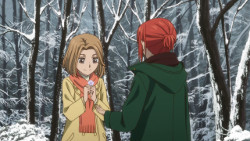 |
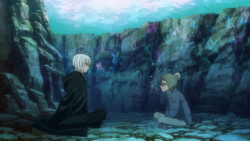 |
 |

Even more than usual, this episode was pure f-ing love!! I want an Elias reddy bear.
Oh, what’s the deal with the Horned God and his Dark Lady, again? Can’t remember if that was ever explained in the manga.
Basically the dualistic (male/female) pagan deities. I just assume they supposedly walk the Earth on the day of Yule, but I don’t recall if the manga went into specifics.
Elias doesn’t say anything here and the episode goes along pretty quickly with no information as to what is happening. The Horned God and his Dark Lady are mentioned by the Yule twins. They say that Chise and Elias should have there preparations in order “Before the Horned God and his Dark Lady walk the Earth”.
In the manga, Elias mentions that they are “the beings mentioned by the Yule Heralds. Gods as fickle as they are ancient. There’s no predicting what will please or anger them. That’s what makes them so frightening. This is the reason why they quickly hide when they sense that the gods are about to pass by.
However, the Dark Lady sees a small piece of mistletoe dropped by Elias and Chise and collects it, looking most pleased. Because of this, we will see in a later episode…
Show Spoiler ▼
In case anyone was wondering about some of the stuff that happened in this episode –
…that test tube that Renfred brought out when meeting Alice? It was a chemical that reacts to those that have an affinity to sorcery. When it crystallized, Renfred decided to take Alice in as his apprentice.
Alice was a junkie, forced into drugs by her own parents so that they could make her go get more when they needed a fix. She had no home, money, and was stuck in a drug habit. She didn’t have any choice but to start dealing drugs to survive. When she collapsed in Renfred’s home, she was starting to go into withdrawal. She spent a month in bed before the drugs were finally purged from her system.
Renfred explained he was an alchemist and wanted to teach her but she didn’t understand and found it difficult to believe him. As she couldn’t see herself as a student, he asked her to become his bodyguard instead.
In the end, Alice asks if Chise has her messenger bird. When she realizes that Chise doesn’t know what she means she lets it go, but in the manga she actually wonders if no one has told Chise about the College.
about the deer like god and the goddess, they are both based on english folklore. the guy is herne the hunter while the goddess is the goddess of season based on wicca with different name for each season.
Young Mother (Imbolc) – Maiden(/Spring Equinox/Beltaine) – Pregnant Mother (Summer Solstice)- The Harvest Mother (Lammas/Autumn Equinox) – The Crone who holds the seed of the quickening God of Light – (Samhain)
She get anything for Silky?
Silky is a brownie. She cannot accept gifts. Remember in episode 9 when Chise goes out and buys stuff with the money Silky gave her? When she comes home she says she bought gifts, then quickly corrects herself and says she bought snacks and such for all of them.
Brownies are supposedly very offended if offered gifts or clothing. From the author’s afterword in volume 3 of the manga:
Silky is a type of Brownie, a fairy that can be found around the house. They like to do domestic chores while the household is asleep. (Though they sometimes play pranks.)
If you ever spot a brownie and its clothes look all tattered, do not give it clothing as a gift. Brownies consider this insulting. If you want to reward them, set a cup of milk or cream on the mantelpiece.
“Christmas Menu
Roast Pork
Fish Chips
Baked Beans
Scotch Egg
Shepherd’s Pie
Sausage”
While yes, all those things are British food, not one of them really belongs on a “Christmas Menu”. And they do appear to *all* be served in the next scene…
I don’t think you can call a tradition over a thousand years old “sanitized” in any contemporary sense of the word.
Sanitize: make (something) more palatable by removing elements that are likely to be unacceptable or controversial.
Christians literally moved the date of the celebration of Jesus’ birth to coincide with existing winter solstice festivals, most likely to co-opt existing pagan customs and remove the references to pagan gods and traditions (though the exact reasons are lost to time and all hotly argued).
What has the age of the tradition got to do with it’s inception?
On the first hand, the Yule scenes were a bit rushed (when my wife asks, “what just happened?” its a bit rushed).
On the second hand, the scenes with Alice were wonderful. She & Chise are natural friends, if they can make common ground.
On the gripping hand, I was awesome at Ohayocon this weekend!
https://www.instagram.com/p/BegeEAKFIWD/
Nice work!